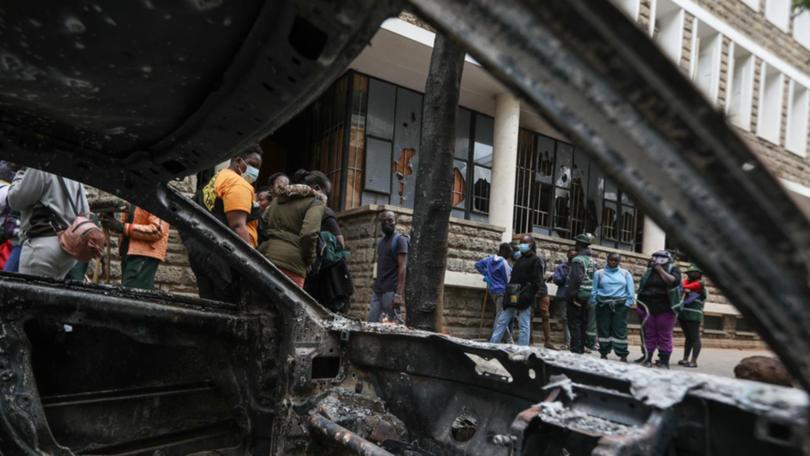Kenyan President William Ruto has withdrawn tax rise plans after more deaths and violent protests
Kenyan President William Ruto has told the public "I concede," in a speech following deadly unrest around tax reform.

Kenyan President William Ruto has withdrawn planned tax hikes, bowing to pressure from protesters who had stormed parliament, launched demonstrations across the country and threatened more action this week.
The move will be seen as a major victory for a week-old, youth-led protest movement that grew from online condemnations of tax rises into mass rallies demanding a political overhaul, in the most serious crisis of Ruto’s two-year-old presidency.
But some demonstrators said on social media that despite Ruto’s climbdown they would go ahead with a rally planned for Thursday, with many reiterating demands that he resign.
Sign up to The Nightly's newsletters.
Get the first look at the digital newspaper, curated daily stories and breaking headlines delivered to your inbox.
By continuing you agree to our Terms and Privacy Policy.Ruto announced he would not sign a finance bill including the tax increases, a day after violent clashes between police and protesters at the assembly and across Kenya left at least 23 people dead and scores wounded, according to medics.
“Listening keenly to the people of Kenya who have said loudly that they want nothing to do with this finance bill 2024, I concede. And therefore, I will not sign the 2024 finance bill, and it shall subsequently be withdrawn,” he said in a televised address with MPs, some clapping, seated behind him.
Vice President Rigathi Gachagua asked young people to call off the protests to avoid any further loss of life and destruction of property and blamed the intelligence services for giving the government poor advice.
“There would have been no mayhem, but they slept on the job,” Gachagua said in a speech, calling on the head of the National Intelligence Service to resign.
Protesters were defiant, repeating calls for Ruto to step down and vowing further action in the streets.
Boniface Mwangi, a prominent social justice activist involved in the protests, called for a “1-million-people march”.
“The arrogance is gone but the lies are still there,” he said on social media platform X.
“Yesterday they unleashed goons and police to kill peaceful protesters. That will not stop us.”
Other members of the protest movement continued to post on social media using the hashtag #tupatanethursday, or “see you on Thursday” in a mix of Swahili and English.
Ruto said he would now start a dialogue with Kenyan youth, without going into details, and work on austerity measures - beginning with cuts to the budget of the presidency - to make up the difference in the country’s finances.
He said the loss of life on Tuesday was “very unfortunate”.
Kenyan police have not responded to requests for comment about the violence.
Even if Ruto’s concession manages to see off the immediate threat of more unrest, it still leaves him caught between the competing demands of his hard-pressed citizens and of lenders such as the International Monetary Fund - which is urging the government to cut deficits to obtain more financing.
On Tuesday, police opened fire on crowds who massed around parliament and later broke into the senate chamber and national assembly, minutes after MPs had voted through the tax measures and sent them on to the president.
The Nation newspaper documented protests in at least 35 of Kenya’s 47 counties, from big cities to rural areas - even in Ruto’s hometown of Eldoret in his ethnic Kalenjin heartland.
At least 23 people were killed across the country and another 30 were being treated for bullet wounds, the Kenya Medical Association said on Wednesday.
Posts on social media had urged people to occupy the State House, the president’s office and residence, on Thursday, and the local offices of the World Bank and the IMF on Friday although it was not immediately clear if the calls came from individuals or a broader movement.
Heavily armed police patrolled the streets of the capital Nairobi, which were quieter than usual on Wednesday.
The protests began as an online outpouring of anger by young, tech-savvy Kenyans at proposed taxes on bread and diapers and evolved into a larger movement calling for the scrapping of the entire finance bill including the taxes.
